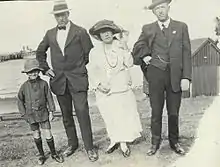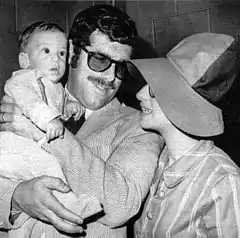Bucket hat
A bucket hat (variations of which include the fisherman's hat, Irish country hat and session hat) is a hat with a wide, downward-sloping brim. Typically, the hat is made from heavy-duty cotton fabric such as denim or canvas, or heavy wool such as tweed, sometimes with metal eyelets placed on the crown of the hat for ventilation.

It was first adopted as a high fashion item in the 1960s, and with subsequent revivals in both street fashion and on the catwalk. It is popular festival gear in the present day, also known as a "session hat" and is favored by fans of bands such as Sticky Fingers, The Stone Roses, King Gizzard & the Lizard Wizard, Oasis, Yung Lean, and The Courteeners.
Origins

The bucket hat or fishing hat is said to have been introduced around 1900.[1] Originally made from wool felt or tweed cloth, these hats were traditionally worn by Irish farmers and fishermen as protection from the rain, because the lanolin from the unwashed (raw) wool made these hats naturally waterproof.[2] From the interwar years onwards, these "Irish walking hats" were quickly adopted internationally for country pursuits because, when folded, they could fit inside a coat pocket. If the hat fell in the mud, it could be easily cleaned with a damp sponge, and it could be reshaped using steam from a kettle.[2] In the 1960s, it was often worn by members of the Mod subculture.[1]
The modern bucket hat is derived from a tropical hat made from olive drab cotton that was issued to the US Army during the Vietnam War. These lightweight hats became popular among civilians for use in sports such as fishing, and as sun protection.[3]

Fashion accessory
In the 1960s, the bucket hat was adapted as a ladies' fashion item, in common with the pillbox, bakerboy, and cloche styles, suiting the fashion for more bouffant hair.[4] Milliners such as Lilly Daché created designs in felt or other stiffer fabrics to capture the "mod" look.[5] The older tweed Irish walking hat remained popular among professional men until the 1970s,[6] and was notably worn by Sean Connery's character in Indiana Jones and the Last Crusade.
The hat became popular with rappers in the 1980s and remained part of street fashion into the 1990s. More recently, it has re-emerged as a fashion catwalk item after being sported by celebrities such as Rihanna.[7]
Regional names and variations
- In Bulgaria it is popular as "idiotka" (Bulgarian: идиотка), which means "idiot hat".[8][9]
- In Australia, this hat is referred to as a "Bucket Hat" and not a "Giggle Hat", contrary to popular belief. "Giggle hat" can be used to refer to a "Boonie Hat", which is commonly worn by the Australian army or gardeners.
- In Israel, it is known as a "Rafael hat", after Rafael Eitan, an Israeli general, politician, and former Chief of Staff of the Israel Defense Forces, who used to wear one. A similar type of hat called a tembel hat is dubbed the national hat of Israel as it was worn by Israeli Halutzim to protect from sunburn.
- In Sweden, it is known as a "Beppehatt" or "Beppemössa", since Beppe Wolgers, a Swedish author and artist, used to wear it and made it popular in the 1970s.
- In Denmark, it is known as "bøllehat" (troublemaker hat) since the 1880s, when a group of young delinquents would gather every sunday in Bøllemosen in Jægersborg Dyrehave, from where they made trips to a popular dance restaurant in Charlottenlund to steal the ladies' hats.
- In Argentina, it is known as "sombrero Piluso" (Piluso hat).
- In South Africa, it is known as an "ispoti" and is very popular with urban black youth, representing being streetwise without copying foreign hip-hop trends.
- In Tanzania, it is very popular among elders, especially among the Iraqw people.
- In the USA, a similar hat is used officially by the US Navy for enlisted service dress uniforms, commonly referred to as a Dixie Cup hat, as in the manufacturer brand of paper cups.
- In France, it is called a "Bob".
In popular culture
- Both fictional characters Inspector Clouseau from The Pink Panther film series; and Detective Lieutenant Louie Provenza of the television series The Closer and Major Crimes frequently wear bucket hats: for Peter Sellers' portrayal of Clouseau, a grayish-shade Irish tweed fabric variety; with Provenza wearing a white bucket hat while at crime scenes.[10][11][12][13]
- Maccer from Grand Theft Auto: San Andreas, throughout the game, wears 'Reni hat' (with the Stone Roses logo in the centre).
- Gilligan from Gilligan's Island is often seen wearing a bucket hat.
- Kevin "Ug" Lee from Salute Your Shorts always wears a khaki, navy blue or white bucket hat.
- Nervous Ron from Grand Theft Auto V wears a dark tan bucket hat with a red, white, and blue stripe on the brim.
- Raoul Duke (played by Johnny Depp) wears a beige bucket hat in the 1998 film Fear and Loathing in Las Vegas.
- In Digimon Adventure 02, Takeru "T.K." Takaishi wears a bucket hat.
See also
References
- Stalder, Erika (2008). Fashion 101: A Crash Course in Clothing. San Francisco, CA: Orange Avenue Publishing. p. 55. ISBN 978-0979017346. Retrieved 3 January 2015.
- "Irish Cultural Society of San Antonio". www.irishculturalsociety.com.
- "Hat Shapers Hat Dictionary". Hat Shapers. Retrieved 3 January 2015.
- "{Hat Week} A Brief History of 20th Century Hats (part 2)". Tuppence Ha'penny Vintage. Tuppence Ha'penny. Archived from the original on 3 January 2015. Retrieved 3 January 2015.
- Marcus, Jonathan D. (8 March 2013). "Fashionable Display at Boca Museum". Sun-Sentinel. Broward County, Florida. Retrieved 3 January 2015.
- Inc, Kiplinger Washington Editors (21 December 1977). "Kiplinger's Personal Finance". Kiplinger Washington Editors, Inc. – via Google Books.
- Cartner-Morley, Jess; Elan, Priya (15 July 2014). "Bucket hats: what's the appeal". The Guardian. London. Retrieved 3 January 2015.
- "идиотка - Тълковен речник - значение на думата идиотка - какво е идиотка". Речник на думите в българския език.
- Идиотка Bucket hat in the Bulgarian Wikipedia
- Sharpe, Mina (23 June 2014). "MCTV Exclusive – G.W. Bailey Talks Major Crimes and The Sunshine Kids Foundation". MajorCrimesTV.net. Retrieved 20 September 2016.
- See image: Morris, Robert (19 January 2013). "Actor from 'Police Academy,' 'The Closer' to ride as Bacchus". Uptown Messenger. Retrieved 20 September 2016.
- See image number 4: defyingnormalcy (4 October 2013). "Fashion Remix: Major Crimes, Episode 02.04". Major Crimes (blog). LiveJournal. Retrieved 20 September 2016.
- TNT (10 October 2013). "Fan Question - Provenza's Hat ¦ Major Crimes ¦ TNT". YouTube. Retrieved 20 September 2016.
External links
 The dictionary definition of bucket hat at Wiktionary
The dictionary definition of bucket hat at Wiktionary Media related to Bucket hats at Wikimedia Commons
Media related to Bucket hats at Wikimedia Commons